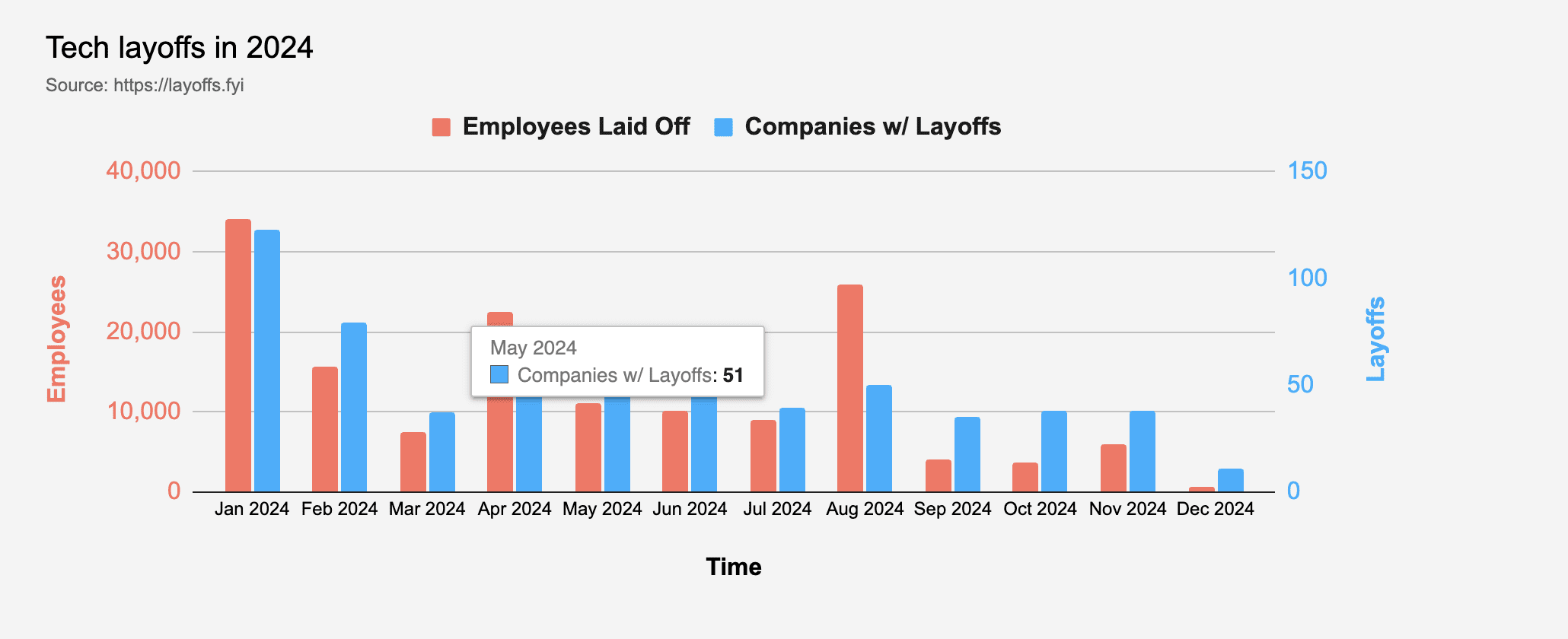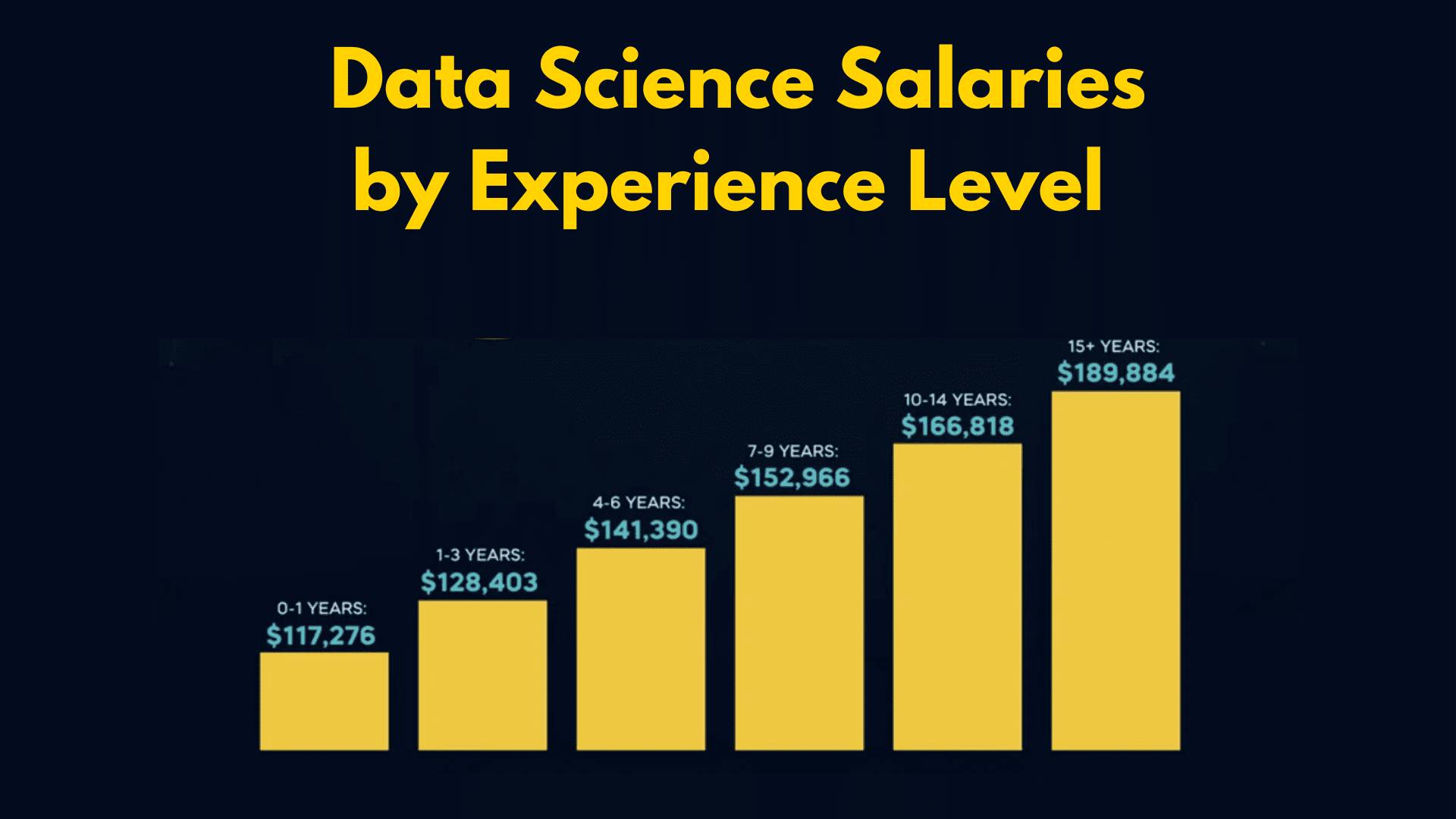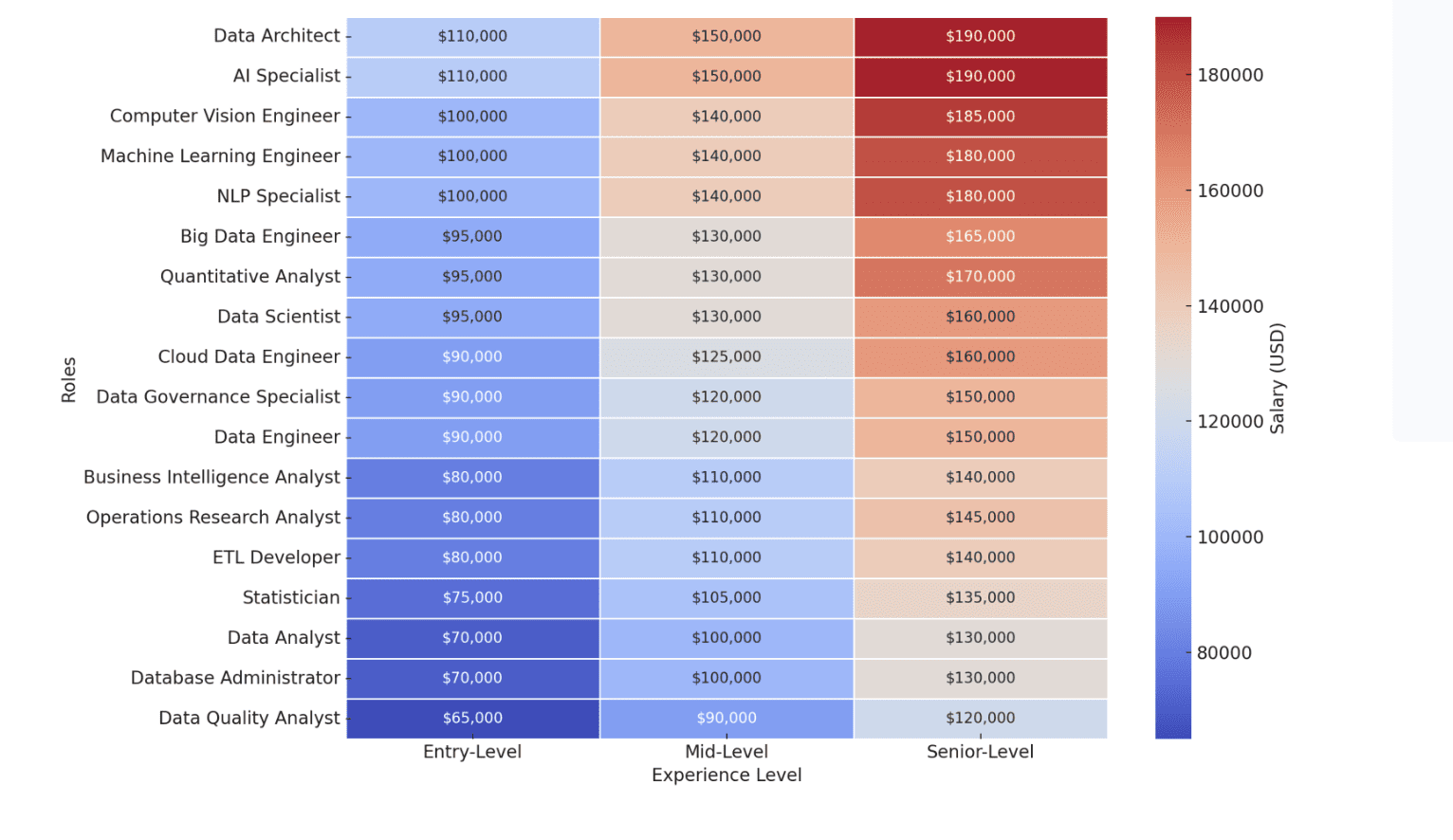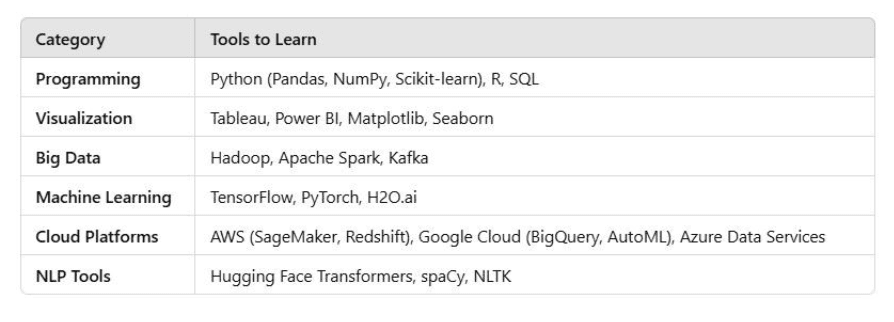Image by Author
Data science is among the best careers to choose from in terms of compensation, but a lot happened in 2024. This year has experienced massive layoffs even from tech giants. As of October 2024, there have been over 476 tech companies that have laid off over 141,467 employees, this according to Layoffs.fyi.


Image source
If we combine this figure with that of 2023, over 428,229 people working in tech have been laid off. Aside from companies trying to cut down on high interest rates, over-hiring, etc., one major factor that has led to this massive layoff is artificial intelligence (AI).
AI is eating deep into the tech job market, as many companies are hiring in favor of employees with AI-related skills and prior knowledge of how to use AI tools and applications. A McKinsey report in June 2023 stated that generative AI would automate 60% to 70% of employee workloads. Even with all of this happening, the data science field is still experiencing growth, and in return, this affects the salaries of employees working in these companies.
The Evolution of Data Science as a Career Path
Data science has undergone a remarkable transformation over the past few decades, evolving from a niche specialization to one of the most sought-after career paths in the modern job market. This evolution is closely tied to technological advancements, and the explosion of data, with professionals in this field originally primarily statisticians or analysts working with structured data sets to generate insights for businesses. However, as the volume and complexity of data exploded with the advent of the internet and digital technologies, the need for more advanced tools and techniques gave rise to the interdisciplinary field we now recognize as modern data science.
Fast-forward to the 2010s, data science had matured into a distinct profession fueled by advancements in machine learning, cloud computing, and big data technologies. Now companies have realized that harnessing unstructured data such as images, videos, and social media activity could provide them with a competitive edge. As a result, roles such as data engineer and machine learning engineer emerged, addressing different aspects of the data pipeline.
Why Salaries and Job Trends in Data Science Matter
Understanding salaries and job trends in data science is essential for multiple reasons both for professionals in the field and organizations looking to leverage data-driven insights. Here’s why this topic holds significant importance.
For Professionals: Career Planning and Growth
- Informed Decision-Making: Knowing current salary benchmarks helps data science professionals evaluate job offers, negotiate better pay, and plan career moves strategically.
- Skill Investment: Salary trends often reflect the value of specific skills. For instance, expertise in machine learning, AI, or cloud computing might command higher compensation, guiding professionals on where to focus their upskilling efforts.
- Career Security: Staying updated on job market demands ensures individuals remain relevant and competitive, particularly as automation and AI begin to influence traditional roles.
For Organizations: Attracting and Retaining Talent
- Competitive Hiring: With data scientists in high demand, offering market-aligned salaries is critical to attracting top talent and maintaining a competitive edge.
- Talent Retention: Organizations that understand evolving trends can build more effective retention strategies by addressing employees’ expectations and career aspirations.
- Resource Allocation: Insights into salary trends help businesses budget appropriately for growing data teams and allocate resources for upskilling existing employees.
For the Industry: Navigating Rapid Change
- Impact of Emerging Technologies: As fields like generative AI, edge computing, and advanced analytics grow, understanding job trends helps industries prepare for shifts in the types of roles needed.
- Global Workforce Trends: The rise of remote work and globalization has changed how salaries are structured across regions, making it crucial to analyze these dynamics for better workforce planning.
For Aspiring Data Scientists: Setting Realistic Expectations
- Awareness of Entry-Level Opportunities: Knowledge of salary ranges at different experience levels helps newcomers set realistic goals and avoid undervaluing themselves.
- Identifying High-Growth Areas: Trends highlight industries or geographies with higher demand, guiding aspiring professionals on where to focus their job search.
Data Science Salaries
Drawing data from reliable sources like Glassdoor, Indeed, and the U.S. Bureau of Labor Statistics (BLS), it is clear that data scientists earn higher than the average salary, which ranges from $74,000 to $185,000 per annum. It is important to note that this salary varies based on location, industry, education, and experience level.


Data science salaries as reported by different reliable sources
Let’s break down and analyze the data by the following categories:
- Data Science Salaries by Industry
- Data Science Salaries by Experience Level
- Data Science Salaries by Education
- Data Science Salaries by Location
1. Data Science Salaries by Industry
In this section, we will group the industries into three distinct industries: high-paying, mid-range, and low-paying industries. Naturally, this comparison is not all-inclusive. There are many different sectors, and the differences within them are as great as those between them. But, this provides us with a decent sense of the variety we may anticipate across other industries.
| High | Midrange (where most companies fall) | Low |
|---|---|---|
| Telecommunications $162,990 |
Government and administration $156,801 |
Agriculture $135,877 |
| Information technology $161,146 |
Management and consulting $156,799 |
Personal consumer services $134,779 |
| Insurance $160,565 |
Arts, entertainment, and recreation $156,793 |
Legal $131,427 |
| Financial services $158,033 |
Healthcare $147,041 |
Manufacturing $121,285 |
2. Data Science Salaries by Experience Level
An entry-level data scientist typically makes $117,276 annually. It goes without saying that your income will increase as your profession advances.
Based on years of experience, Glassdoor has estimated the median yearly total compensation for data scientists in the US as follows:


Median yearly total compensation for data scientists in the US by years of experience (Glassdoor)
- 0-1 years: $117,276
- 1-3 years: $128,403
- 4-6 years: $141,390
- 7-9 years: $152,966
- 10-14 years: $166,818
- 15+ years: $189,884
3. Data Science Salaries by Education
According to Zippia, a data scientist with a bachelor’s degree makes, on average, $101,455 per year, while a data scientist with a master’s degree makes, on average, $109,454. This suggests that when you pursue further schooling, your pay as a data scientist will rise. The exact amount will obviously vary and depend on other factors, but the basic correlation holds.
This shouldn’t come as a surprise. Employees with advanced degrees typically make more money because it demonstrates to companies that you have the initial experience they want. Having a bachelor’s or master’s degree will help you get started. After that, your pay will be determined by how well you do.
4. Data Science Salaries by Location
Your income is significantly impacted by where you reside. Take a look at the table below to see how salaries differ between countries and specific metro areas.
| Country/City | Average Total Salary with Additional Pay (USD) | Salary Range (USD) |
|---|---|---|
| UK | $79,978 | $50,885 – $90,318 |
| London | $92,052 | |
| Germany | $85,115 | $67,505 – $90,369 |
| Munich | $78,941 | |
| Switzerland | $143,360 | $119,710 – $153,090 |
| Geneva | $131,813 | |
| Romania | $45,531 | $31,489 – $83,979 |
| Bucharest | $57,726 | |
| Bulgaria | $47,425 | $33,401 – $80,162 |
| Sofia | $47,458 | |
| Egypt | $14,368 | $6,990 – $25,631 |
| South Africa | $44,436 | $23,788 – $65,084 |
| India | $16,759 | $9,604 – $24,070 |
| New Delhi | $18,662 | |
| Mumbai | $14,745 | |
| Hyderabad | $14,242 | |
| Japan | $54,105 | $40,579 – $67,632 |
| Tokyo | $52,081 | |
| Australia | $79,218 | $64,591 – $94,251 |
| Sydney | $85,032 | |
| Canada | $73,607 | $59,539 – $92,986 |
| Toronto | $75,911 | |
| USA | $156,790 | $130,550 – $189,320 |
| San Francisco | $178,636 | |
| New York | $160,156 | |
| Boston | $155,984 | |
| Chicago | $140,744 | |
| Denver | $140,293 |
Projected Salaries for Data Scientists and Related Roles in 2025
The projection for top data science and related roles for 2025, from entry-level to senior-level positions, is shown in the chart below. It highlights opportunities in roles like data scientist, AI specialist, and data architect, helping you plan your career in this high-demand and diverse field.


Image source: Refonte Learning


Image source: Refonte Learning
Unlock Your Full Earning Potential in 2025
With the right blend of skills, experience, education, and certifications, you can land lucrative roles in the industry in 2025 and beyond. Here’s how you can boost your earning potential:
- Master Essential Skills: A solid grasp of programming languages like Python, R, and SQL is a must-have for any data science role. Building expertise in areas like machine learning, big data tools (Hadoop, Spark), and cloud platforms (AWS, Google Cloud) can give you a competitive edge and open doors to higher-paying opportunities.
- Pursue Specialized Certifications: Earning certifications such as the Google Professional Data Engineer, USDSI’s Certified Senior Data Scientist (CSDS™), Harvard University’s Data Science Inference and Modeling, or UCLA’s Exploratory Data Analysis and Visualization can make you stand out. These credentials can help position you for premium roles in a crowded job market.
- Focus on High-Demand Specializations: Developing expertise in sought-after fields like AI, machine learning, natural language processing (NLP), and data architecture can unlock some of the best-paying jobs in the industry. Specialized knowledge often translates into higher salaries.
- Target Top-Paying Industries: Certain industries consistently offer the highest compensation for data scientists, including finance, tech, healthcare, and consulting. Focusing your job search on these sectors can significantly increase your earning potential.


Suggested data science tools to learn by category
What’s Next?
With all sorts of industries becoming increasingly dependent on data, there will be numerous opportunities for data science and related fields in 2025 and beyond. The secret to job security and earning a high salary is to stay on top of trends and always learn new things.
For professionals and aspiring data scientists, staying ahead means keeping a pulse on job market trends, honing AI-related competencies, and building expertise in high-demand areas like machine learning and data architecture. With industries increasingly reliant on data to drive decisions, the future of data science is promising for those prepared to navigate its changes.
References
Shittu Olumide is a software engineer and technical writer passionate about leveraging cutting-edge technologies to craft compelling narratives, with a keen eye for detail and a knack for simplifying complex concepts. You can also find Shittu on Twitter.
